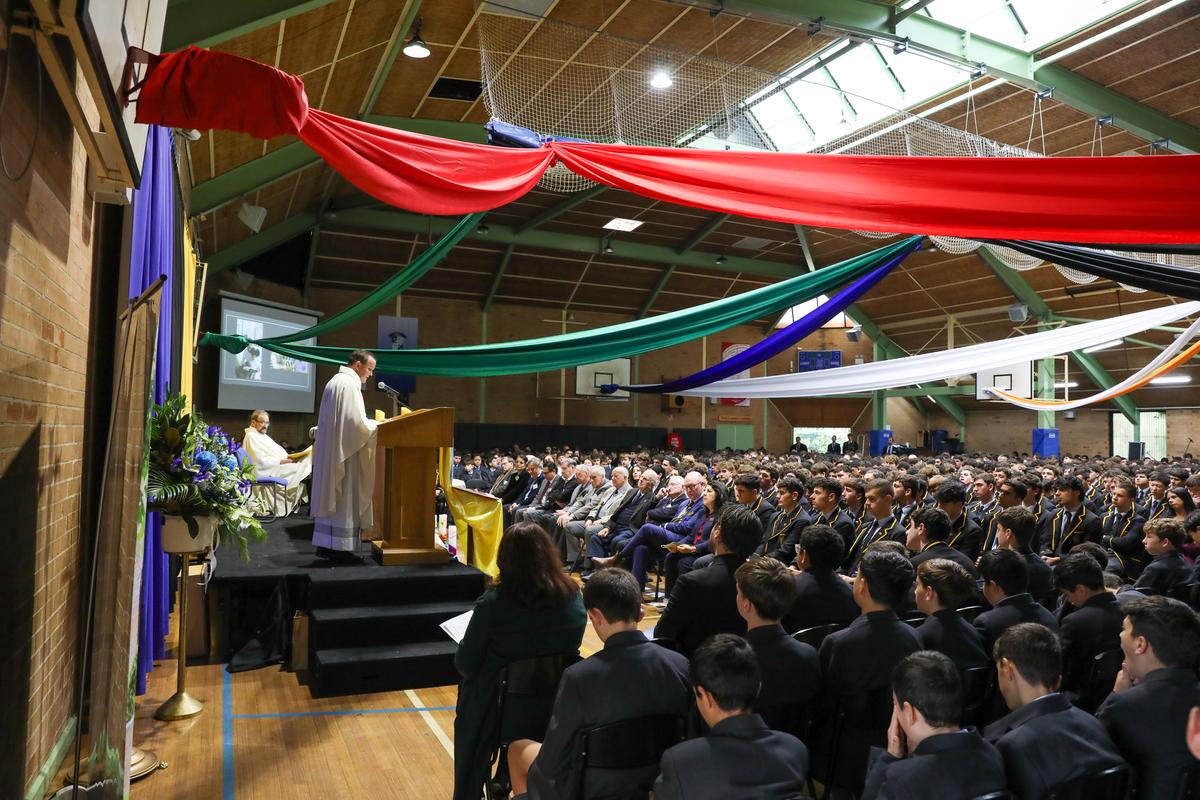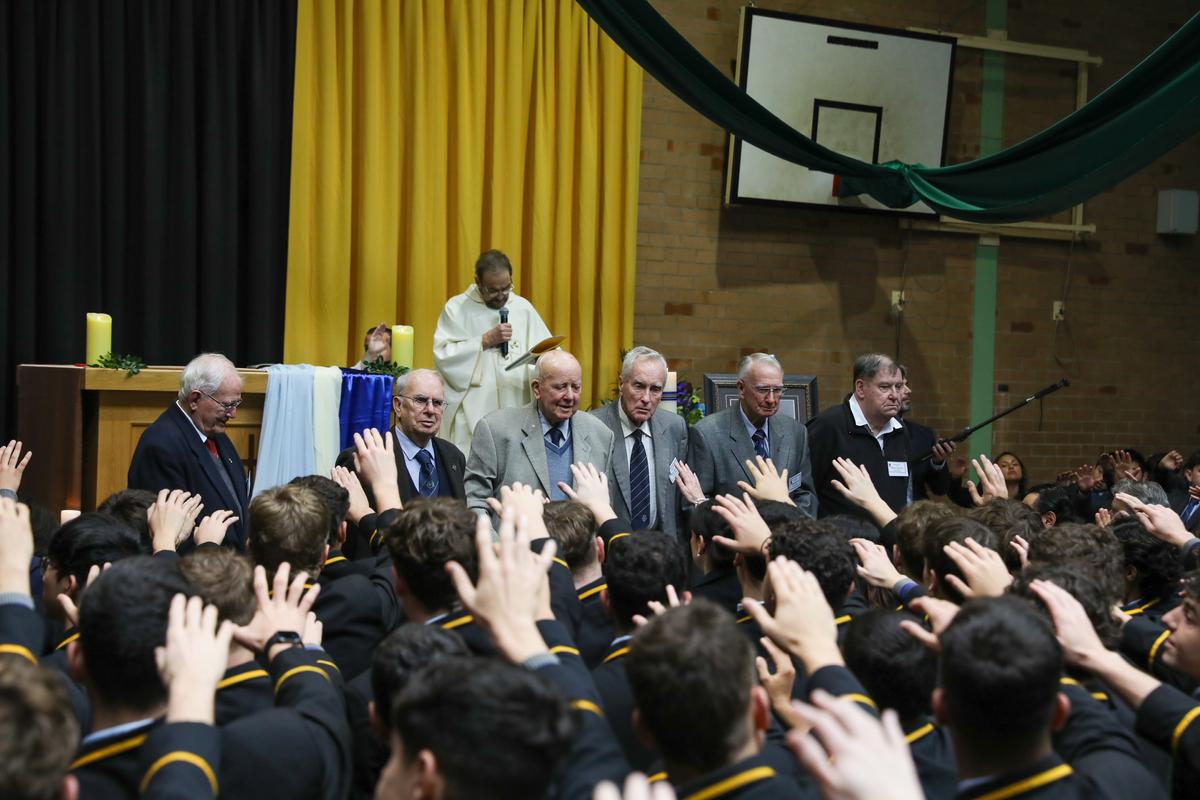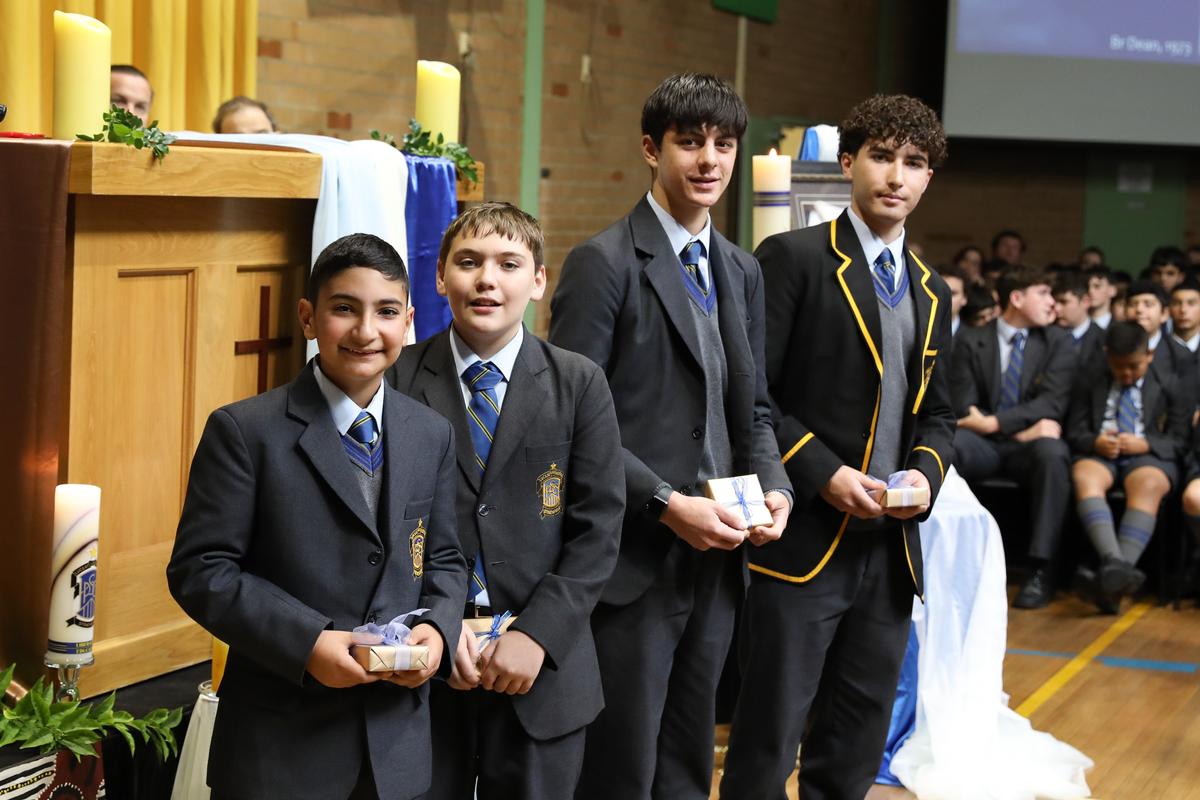Principal

Founder's Day
Last Friday, the school celebrated its founder, Blessed Edmund Rice, with a mass, shared meal, and Year 12 Performances. Sadly, the Waterford Mile had to be postponed and our Primary boys dismissed early because the enormous amount of rain the night before left Breen Oval a quagmire. Despite having to move to wet weather arrangements, it was a wonderful day.
We especially welcomed our special guests:
- Mr Sam Hardjono, Chair, EREA NSW Colleges
- Dr Anne Wenham, College Advisory Council
- Ms Natalie Baini, College Advisory Council
- Mr Con La Spina, College Advisory Council
- Elena Ierardo, President, P & F Committee
- Caroline Chahin, Vice President, P&F Committee
- Br Brian Berg, cfc (Old Boy)
- Br Tony Whelan, cfc
- Br Vince Duggan, cfc
- Br Bob Wallace, cfc
- Br Mark Cody, cfc
- Br Jack O’Shea, cfc
- Fr Jack Evans, Co-Celebrant, College Chaplain
- Fr Tom Stevens, Co-Celebrant, St Patrick’s Mortlake
Edmund Rice educators, like me, today are still inspired by his example, which was grounded in the teachings of Jesus and Gospel values in over 22 countries. The Edmund Rice Family has spread across the world since Blessed Edmund opened his first school in 1802, a place where I have now actually visited and can better appreciate the obstacles he had to overcome. Today, we face different obstacles – a persistent attack on private schools, especially faith-based ones, and consistently negative rhetoric about boys’ schools and the trope that boys within them collectively exhibit traits now, given the moniker toxic masculinity.
For our students, not only is Founder’s Day a day to celebrate our special community, but it is also a day to reflect on what we can learn from the Founder, Blessed Edmund Rice. He was a perfect example of how to make the changes he wanted to see in his community of Waterford. Many people expect change in others, expect change in the world, but are never willing to change themselves first.
Edmund Rice was a man of action. And what lessons can we learn?
If you want to see change in others, you must first BE THE CHANGE YOU WISH TO SEE.
If I want others to be better: I MUST BE BETTER.
If I want my friends to act a certain way: I MUST LIVE that way, I must BE THAT EXAMPLE.
Not TELL them how to be but BE that person. If I want them to be kind to others: I must be kind to others.
If I expect others to be KIND: I must be kind, I must be compassionate.
If I expect others to listen and be understanding, I MUST listen, really listen, and really try to understand.
If we do expect all these things, we will need to live these things. Let each of us here today live as the person we expect others to be. Let us be the change that we wish to see.
Founder’s Day Student Award Winners
After asking the boys to nominate the boy who they felt was the embodiment of our touchstones, the boys identified by their peers were:
- Stage 3 Matthew Nader (Year 6)
- Stage 4 Andre Grasso (Year 7)
- Stage 5 Francesco Mazza (Year 10)
- Stage 6 Patrick Bressa (Year 11)
Hearing the rousing applause each boy received from their peers was wonderful. Congratulations!
For the first time this year, we had a staff Touchstone Award. In 2024, Mr James Crino was the teacher who exhibited a commitment to ensuring his students experience a Liberating Education, one of our touchstones.
The Importance of Team Sports for Boys
I thank each and every parent who has taken the time to write to Strathfield Council about Hudson Park's continued use to include our College, as it has done for over 60 years. This is not about a private school influencing its local council to exclude other public groups. We use those fields for training during the week and games on Saturdays, and we have happily co-existed over decades. Losing the ability to train and play locally will have serious consequences for our students and the College’s ability to meet its ISA obligations. There would be a limit to the number of teams we could field, and sport will become the domain of only the strongest and successful athletes in our school. This would be a great shame as playing a team sport is so important for young males and is one feature of the College that parents and their sons truly appreciate.
Participating in sports of any kind is obviously beneficial from a health and weight standpoint; in a country that continues to struggle with obesity and youth are more inactive than ever, sports provide a vital dose of physical activity.
But participating in team sports also has a particular benefit to young men: it’s one of the few, likely only, chances for a young man in the modern world to be part of an all-male “gang” in pursuit of a physical goal.
As laid out by authors like Lionel Tiger in Men in Groups and Jack Donovan in The Way of Men, the gang has been the fundamental unit of the male sex since primordial times. Bands of men would work together to hunt and to battle, and much of what underlies the core of masculinity grew out of this group dynamic.
The modern sports team remains one of the last bastions of the male gang ethos, and if a boy doesn’t participate in one, he’ll likely never experience it unless he later joins the military. Thus, a young man who does not participate in a team sport will miss out on understanding a large component of the masculine experience.
A member of a team experiences two sources of motivation: the desire to be the best on his own squad, and the desire to beat external opponents. These dynamics work in tandem to bring out the best in a young man — both in his athletic potential and in his respect for others. While two players of the same team might compete fiercely for a starting position, they ultimately have to keep their conflict in check; they have to yearn to be on top with all their heart, and yet be able to step back when beat out by a teammate, accepting what’s best for the team as a whole.
A competing team provides something for boys to push back against together. If they win, they have a chance to learn how to be magnanimous in victory; if they lose, they learn how to be gracious in defeat.
The paradoxical thing about participating in team sports is that it both checks a young man’s status and elevates it. The concrete, real-time feedback it provides brings self-assessed measures of worth — which can become inflated when gauged in the abstract — down to earth. But at the same time, belonging to the team raises your sense of status — gives you a sense of identity and belonging and value. Together, these forces provide young men with a healthy, balanced sense of self.
Being on a team requires a boy to learn that to win; he’s got to put the team ahead of himself. That means passing it to an open player on the court instead of trying to force a shot. Success in life depends on learning how to cooperate with others; team sports give boys a chance to hone that skill in every practice and every game.
Male camaraderie is a special energy, a unique dynamic. It comes from men being able to take teasing without being insulted and give and take criticism and feedback without being offended. It comes from learning to pull their weight and being committed to not letting the team down. From having a sense of honour. Research has shown that males bond when working together to defeat a common foe or tackle a difficult challenge. A shared code, a shared purpose, builds bonds.
Being in the “trenches” with other guys on a sports team thus fosters close friendships both on and off the field. Camaraderie is particularly developed when men not only share in a common purpose, but in physical effort. Studies have shown that strong ties are built when you exercise with others in a group, and the more intense the exercise, the greater the connection. Further, doing synchronous movements with others improves each individual’s performance. There’s just something about doing hard, physical things as a team that brings people together, and brings out their best.
This effect isn’t just good for a boy’s performance and sense of belonging — it sets him up to have a healthy relationship to “voluntary suffering” for the rest of his life. A young man growing up in the modern suburbs may have no other chance to experience physical “hardship” and to learn that he cannot only push through the pain and strain but that there’s a certain satisfaction, even pleasure, in doing so. The brain connects physical effort not just with physiological pleasure but the pleasures of moving as one with a team. Later in life, this association between exercise and enjoyment remains.
In contrast, men who did not participate in sports growing up and try to get into fitness later in life often experience the pain of exertion as foreign and unpleasurable. They seem to have a harder time getting into the groove of regular workouts compared to those who viscerally associate pushing themselves physically with some of the best times of their lives.
For all these reasons, we will continue to fight for the use of our local fields.
In Memoriam
We pray for Nathan Devine ('24) and his familyas they mourn the loss of his beloved grandmother June Devine, who passed away recently. The Devine family has a strong association with the College, with his dad Steven ('85), brother Mitchell ('17), uncle Brad Devine (’80) and cousins Jacob (’07), Alex (’09) and Kyle (’18) all Old Boys of St Patrick's.
We also keep in our prayers Leonardo Smith (Year 5 Gold) and his family. Sadly, Leonardo’s great grandfather Aldo Cavagnino passed away on the weekend. Aldo was also a grandfather to Old Boys Phillip Smith ('04), Daniel Cavagnino ('08), James Smith ('09) and David Cavagnino ('13).
Eternal rest grant unto them, O Lord, and let perpetual light shine upon them. May their soul and the souls of all the faithful departed, through the mercy of God, rest in eternal peace. Amen. |
|---|
Dr Vittoria Lavorato
Principal
SPC boys can do anything!
**except divide by zero




